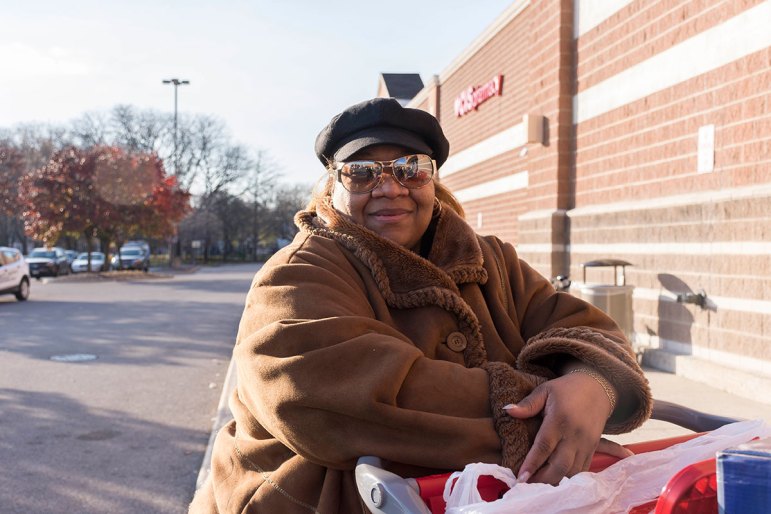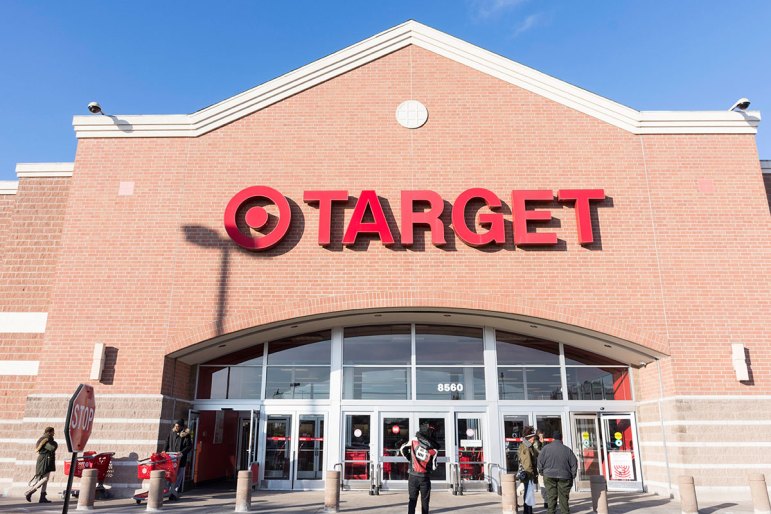The Target at 87th and Cottage Grove had become a favorite for seniors for its accessible parking just steps from the entrance.
But come February, there will be no Target stores in Chicago south of 53rd Street after the company announced plans last month to close its locations in Chatham and Morgan Park, a move that has drawn widespread criticism from African-American residents and elected officials.
“That’s how they do us in the black neighborhoods,” said Coneva Davis, who’s lived in Chatham since 1965 and has grown accustomed to big-box stores abandoning the community. “It’s ridiculous.”
At the same time as the Minneapolis-based retailer is closing nearly all of its stores on the South Side, it has plans to open two more stores on the North Side next year. By the end of 2019, 16 of the company’s 19 Chicago stores will be north of Roosevelt Road.
A Reporter analysis of Target’s Chicago locations and Census data shows the retailer is opening smaller stores in younger, wealthier and whiter neighborhoods.

Target has opened six new stores since October 2015, all but one of them on the North Side: In Streeterville, Lincoln Park, Hyde Park, Wicker Park, and two in Lakeview. Next year, new stores will open in Rogers Park and Logan Square. City officials have also said a new shopping center in Albany Park that received $13 million in tax-increment financing earlier this year will include a Target, though the company hasn’t formally announced that location yet.
Five of the eight newest and planned stores are in ZIP codes where the median income is above $79,000 — considerably higher than the citywide median of $50,434. Only the Hyde Park and Rogers Park stores are in ZIP codes with incomes below the city average.
For comparison, the Chatham store is in a ZIP code with a median income of just $32,024, while the median income near the Morgan Park location is nearly $60,000.
The neighborhoods where Target has been expanding also tend to be younger. All but two of the stores are in ZIP codes where the median age is below the city’s median of 33.9. The Chatham and Morgan Park stores are in ZIP codes where the median age is 39.1 and 43.9, respectively.
The newer Target stores are also in neighborhoods that are much whiter than the city as a whole. Combined, the five ZIP codes where Target opened its most recent stores have a population that is 67 percent white, compared to a citywide population that is just 32 percent white. The two stores opening next year are in ZIP codes that are more than 40 percent white.
The stores that Target is closing, on the other hand, are in ZIP codes that are 21 percent white and just 1 percent white.
Target claims that there is no racial bias behind their store closings, and that the Chatham and Morgan Park stores were simply underperforming.
“Our decision to close the stores at 11840 S. Marshfield Ave. and 8560 S. Cottage Grove Ave. is based on the performance of the stores and is not about a neighborhood or geography,” the company said in a statement.
Residents consider possible Target replacements

Last Thursday, Niki Moore made her second visit to the Chatham Target in a week, to stock up on groceries along with household essentials because it’s one of the only “one-stop shops” nearby.
“I think it’s a tragedy because we don’t have too many places to shop in the community,” she said. “We’re getting really, really sporadic with our shopping centers. It goes back to why our kids are obese. More and more corner stores and less grocery stores.”
Ald. Roderick Sawyer (6th), whose ward includes the Chatham Target, acknowledged community members were upset about the announced closure, but said he was already moving on to solutions. He said he met with the Target team, which owns the building, about options for the next tenant or owner.
“We just have to find a way to repurpose the building. I’m not going to sit around and beg someone to stay who doesn’t want to be here,” he said. “I want to make sure it’s deliberate with community involvement. It’s not something that’s going to be done overnight.”
The shopping centers in Chatham and Morgan Park that Target is abandoning are still home to several large national chains including Walgreens, GameStop, Foot Locker, Marshall’s and GNC. In fact, Old Navy just opened a store in the Morgan Park shopping center where Target is closing.
However, the disinvestment of big-box stores from black neighborhoods is not entirely new. As we reported in 2015, large retailers like Target tend to steer clear of poorer, black neighborhoods, leaving openings for small business, like corner stores, and stores like Family Dollar that target underserved communities, sometimes to their detriment.
Earlier this year, Sawyer and business owners from the area railed against King Food and Deli, which sits a few blocks west of the Chatham Target, for their limited grocery options, unhealthy snacks and host of tobacco products. They dubbed the small convenience store located at the corner of 87th street and South King Drive a “problem business” contributing to negative stereotypes with its bulletproof glass counter.
As rumors swirled last week that the business was closed, Sawyer said the business would be transitioning to a “full-service food place,” based on community input.
“It’s a testament of how the community can work together with businesses to provide something more in line with what the community wants,” he said. He added that while he’s in favor of more mom-and-pop stores for the area, that probably won’t be an option because of the size of the Target property.
For Yolanda Lindsey, 51, who was born in Chatham and has shopped at the Target since it opened in 2002, the changes, however inevitable, are disheartening.
“I hate it…This is the only store in the neighborhood that has everything you need,” she said.
Protest planned for “Black Friday”

Even though Target officials said the decision to close the South Side stores on February 2 is final, some politicians are intent on punishing the businesses for its disinvestment while they still can.
U.S. Rep. Bobby Rush (D), whose district includes both the Chatham and Morgan Park stores, is organizing a protest in front of the Chatham Target beginning at 7 a.m. on Black Friday. He said the company added insult to injury by staying open through the holiday season only to pack up and leave months later.
“We want to drive home to other retailers you won’t treat us in the manner Target is treating us,” he said.
While the company says it will work to fill the vacant space, it won’t be easy. To Rush, the closure draws comparisons of Jeffrey Plaza, near 71st and Jeffrey, which never fully recovered after Dominick’s left in 2013.
“It’s a gaping hole for the community that certainly creates an expansion of the food deserts, quality shopping deserts and pharmacy deserts,” Rush said.
Correction: An earlier version of this story incorrectly stated the time of a protest planned to take place at the Chatham Target on Friday, Nov. 16.



This is why we need our own grocery stores and department stores in the black community. Grocery stores can be small, but have everything you need. Big supermarkets are very expensive and hard to maintain and cost tons of money in upkeep. Big Corporations control most supermarkets in America. Costco, Sam’s Club, Wal Mart, Target Supercenters, Whole Foods and others have all the economic resources necessary for that type of business. But the everyday entrepreneur does not. Even most white business owners ain’t got money like that. And most of these big corporations are owned by stockholders and they got to answer to their stockholders. So they got to go where they can guarantee a return for their shareholders. Family Dollar and Wal Mart targets low income families and low income communities. But the big grocery chains like Whole Foods and others tend to serve wealthier communities, Target too. I believe in small black owned businesses serving our community with everything we need to where we ain’t gotta go nowhere else to buy nothing along with major grocery and retail chains to bring in economic development, create jobs, and raise property values and strengthen the tax base of the community. Plus with the growth of small businesses, the people can circulate their dollars more effectively. Black owned businesses employ over a million black people everyday. But these big retailers are looking at their bottom lines. They see black neighborhoods in Chicago and across America as risky investments due to their high concentrations of poverty and unemployment, but despite this, several major retailers and grocers are already in black neighborhoods. But more importantly, we got to control our neighborhoods and make them prosperous places, nobody else will do it for us, but us.
Indeed. Well-articulated. And when one factors in the MILLIONS that Black people pay into the city, county, state, and national government EVERYDAY… those are dollars that we DO NOT spend creating the types of independent businesses you speak of.
At times like this, one has to appreciate the psychological genius of The Honorable Elijah Muhammad, the pro-Black economic savvy of Booker T. Washington, and the race consciousness of The Honorable Marcus Mosiah Garvey.
Great ideas then… great ideas now.
I hear that, the spirit of socio-economic black empowerment of these great souls are with us today. There are many new black entrepreneurs emerging everyday and there are countless microcosms of black business districts that are serving as a blueprint for what we need to be doing en masse. The Grid in Chicago showcases Auburn Gresham, Bronzeville, and South Shore where real successful black entrepreneurship is growing and thriving. There are nice beautiful homes in these places full of black homeowners, black professionals, and black business owners. But there needs to be more. We have no black equivalent of Apple or Microsoft. We have no black version of IBM, CISCO SYSTEMS, SONY, T MOBILE, AT&T, WAL MART, HOME DEPOT, SEARS, OR COSTCO. THESE ARE. GLOBAL CORPORATIONS THAT COMPETE GLOBALLY WITH BUSINESSES IN CHINA AND JAPAN. WE GOT ABOUT 28 BLACK OWNED BANKS AND CREDIT UNIONS. 100 YEARS AGO WE HAD 130. We don’t have major distribution networks for black owned business products. We have 15000 black owned businesses in America that are making in the tens of millions and beyond, a small handful of black billion dollar businesses. We have tons of small, but successful black owned businesses that are doing well and their revenues are growing, but collectively overall, black owned businesses are not competitive globally. Black owned businesses do contribute heavily to the U.S. Economy without a doubt but more needs to be, much more.
Thank you, Orlando and Zimboni for your insightful feedback! There is The Black Mall on East 79th https://shop.theblackmall.com/ and a few other pockets of entrepreneurship here and there, but true economic independence for the Black community is sorely lacking…Peace.
Let’s open a food co-op in that space
Shiznit snickety snack. We must force stores to stay open even though they’re unprofitable. That just makes good financial sense. Whatever we do, let’s not ask any questions about WHY these stores are doing bad. That may lead to answers we don’t want to hear. There’s always a rich white man to blame for all our problems, so let’s concentrate on that. Continue boycotting the store that’s already closing, that will certainly teach them a lesson.
Ain’t nobody stopping blacks from building wrwaltg